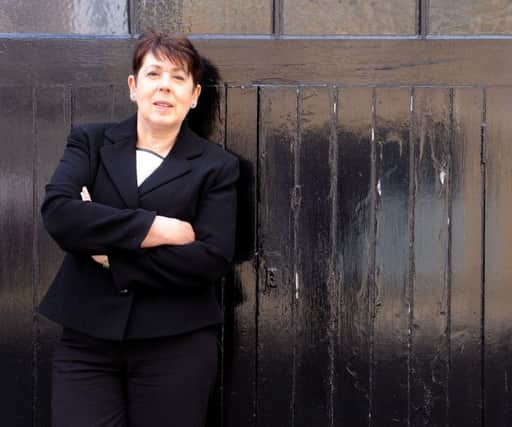Monday Interview: Polly Purvis, ScotlandIS


“I think this is a ten-year, or probably even longer, campaign,” admits the chief executive of ScotlandIS, the trade body for the digital technologies sector, which contributes some £4 billion to the Scottish economy and employs around 80,000 people.
However, it is likely that women account for only 16,000 or so of that total, as it is estimated that men make up about 80 per cent of the technology sector workforce.
Advertisement
Hide AdAdvertisement
Hide Ad“We do need to do a lot more,” says Purvis, a former banker who has been with ScotlandIS since before it technically existed. She previously worked for the Scottish Software Federation, which merged with the Internet Society of Scotland and the Interactive Media Alliance Scotland at the turn of the century.
“The reality is there are lots of women working in the technology industry but they’re often not working in tech roles. You tend to find women working in areas like business development and marketing, but if you look at the workforce in places like India and Vietnam, the people doing the technology end of the job are more than 50 per cent female.”
If companies are trying to sell their products to as wide an audience as possible, Purvis argues they’re “daft” to exclude half the population from their workforces, and she points out that there is no inherent reason why women should not be working in software development and other techy areas, “but in the West we’ve got into a situation where it’s become seen as a geeky sector”.
She adds: “We have a lot more to do to get girls to understand the opportunities, and nowadays you can do anything with technology. But you don’t have to come into the industry just for technology’s sake – you can look at it as the appliance of science.”
Purvis took a rather circuitous route into the sector, having studied agriculture and food marketing at Newcastle University – her father was a civil servant in the Ministry of Agriculture – and then heading south to work for Royal Bank of Scotland.
“In those days, the English arm of RBS was called Williams & Glyn’s, and I started my career with them as a graduate entrant,” explains Buckinghamshire-born Purvis, speaking ahead of this week’s ScotlandIS Digital Technology Awards. The event, on Thursday, will now be held at the Edinburgh International Conference Centre after the initial choice of venue, Glasgow’s Arches, called in administrators.
She adds: “It was retail banking in the City, but we did everything from handling people’s everyday accounts right through to the business accounts of organisations like Guinness, so it was a very wide-ranging set of customers.
“It was good fun – it was in the days before Big Bang – and we got involved in all sorts of exciting things like stock exchange flotations, including the British Gas privatisation.”
Advertisement
Hide AdAdvertisement
Hide AdPurvis has been ScotlandIS chief executive for four years. The organisation has about 300 member companies and relies on funding from the industry, which appears to be in a rather upbeat mood, according to a recent survey.
A survey of 150 firms, carried out on behalf of the trade body by Aberdeen & Grampian Chamber of Commerce, found 83 per cent were planning to increase staff numbers, with 86 per cent expecting sales to rise in the coming year.
Although Purvis has warned that a shortage of skilled people could stop the industry from reaching its full potential, she is confident that steps are being taken to address the problem. Last year, Skills Development Scotland drew up an action plan for the digital technologies industry, and one of the key aims is to encourage more children to consider a career in the sector. The skills investment plan also called for the establishment of computer clubs for girls in 50 schools.
“To be fair, there is a lot of work going on in schools, such as up-skilling computing teachers and devloping the curriculum, right down into primary schools with projects involving Raspberry Pi,” observes Purvis, referring to the low-price computer that’s the size of a credit card and aims to encourage people of all ages to explore computing.
“One of the great things I’ve seen in the technology sector in the past decade is that barriers to entry have come down so much that you can literally start a business with a laptop from your bedroom. We also have a great business angel community in Scotland, so there is access to funding to help move businesses forward.”
While the likes of Skyscanner and FanDuel are the “poster children” of Scotland’s tech sector, Purvis also highlights trailblazers like Jude Cook, co-founder and chief executive of crowdfunding platform ShareIn, for showing what can be done with the right idea and ambition.
“It is great to see the number of young women starting their own businesses, but we’ve got to encourage more into the industry.
“The other area we need to start addressing seriously is getting women on the boards and into senior management positions at tech companies. Until we do that we won’t have solved the problem.”
30-second CV
Job: Chief executive, ScotlandIS
Born: Buckinghamshire
Advertisement
Hide AdAdvertisement
Hide AdEducation: Newcastle University, agriculture and food marketing
First job: Graduate entrant at Williams & Glyn’s
Car: Vauxhall Corsa – I used to have a Mazda MX-5 and I’d love to have another one
Favourite mode of transport: Probably the train nowadays – if you book ahead you get good deals in first class
Music: Eclectic – everything from Van Morrison to Paolo Nutini
Favourite place: I find Edinburgh difficult to beat, but if I had to choose a favourite city it would probably be Verona
What makes you angry? Inequality in all its guises
Best thing about your job: It’s different every day and I’m always meeting interesting people